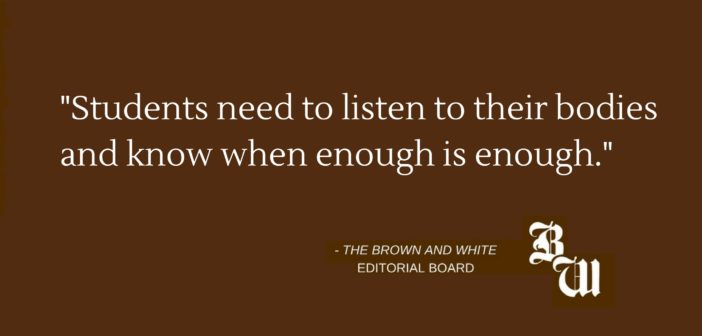Away from home and parental supervision, college is sometimes the first place students experience binge drinking as a socially accepted “norm.”
After a long and stressful day, going out with friends is a way to let loose and have fun. But for those who have not been exposed to many drinking opportunities in their pre-college lives, a night involving chugging cups of bottom-shelf vodka mixed with Kool-Aid can potentially result in a trip to the hospital.
This is not unique to first-years. Even basement-party veterans are exposed to the dangers of alcohol poisoning.
All students, regardless of whether they are affiliated with an organization, are at risk of these dangers. This includes athletes, students in Greek organizations, and members of cultural groups and music organizations. The list goes on.
In response to the frequency of alcohol-related hospitalizations, Lehigh’s Interfraternity Council recently passed a ban on hard alcohol at all IFC-sponsored events. The ban is backed by a conscious effort to reduce negative alcohol-related incidents — any chapter that breaks the ban will face severe consequences.
While this rule only applies to Greek organizations, the problems presented by consuming large quantities of hard alcohol aren’t exclusive to Greek-affiliated students.
In theory, the ban will be beneficial for the safety and well-being of most students who have taken up binge drinking as a hobby. If we were to follow the letter of the law, students under the 21-year-old drinking age would not consume alcohol. Ideally, students will drink responsibly and not feel the need to take vodka to the face three — or more — times a week.
With these statements in mind, underage drinking does occur and it likely has occurred since the law declared 21 as the legal drinking age in 1984. As students, we are not against underage drinking, but we do support safe habits surrounding it.
All of these factors have been acknowledged. Of course, nobody wants to see their friends taken to the hospital because of excessive alcohol consumption. Hospitalizations are scary and should be avoided.
But there are some problems that may follow IFC’s ban.
Those who think that the ban will stop the consumption of hard alcohol in its tracks are ignoring reality.
While the hard alcohol ban should have a positive effect on students’ safety, it is still unclear how it will actually be applied and enforced.
It is admirable IFC is trying to cover its bases as an organization responsible for the well-being of many students. But it is likely some Greek members and unaffiliated students who attend Greek parties don’t understand the purpose of the ban. There are always people who feel as if the rules don’t apply to them and do whatever they want behind closed doors.
It is likely if hard alcohol is banned at parties, partygoers will feel tempted to drink excessively before they arrive. This type of pregaming certainly puts students at risk for hospitalization.
Second, those who are under the legal drinking age already illegally drink hard alcohol — why would this ban suddenly stop them from binge drinking? When they’re chugging their tenth drink of the night, will it have mattered that it was beer instead of jungle juice?
In another sense, maybe the problem doesn’t solely rest in what students drink, but how much they drink. Students can still put themselves at risk by excessively drinking beer and wine.
Coming to college is a time to grow, learn and become independent. Let’s be honest: for a lot of people, college is the time and place to come of age. Most of the time, this involves experimenting with things like alcohol, whether it is legal or not.
As young adults, we don’t need our hands held when making these sorts of choices. But at the same time, being educated on the potential dangers of alcohol is an important application to everyone’s lives, not just those who have Greek affiliations.
This whole problem is a matter of learning our limits. Students need to listen to their bodies and know when enough is enough.






Comment policy
Comments posted to The Brown and White website are reviewed by a moderator before being approved. Incendiary speech or harassing language, including comments targeted at individuals, may be deemed unacceptable and not published. Spam and other soliciting will also be declined.
The Brown and White also reserves the right to not publish entirely anonymous comments.
1 Comment
“This whole problem is a matter of learning our limits. Students need to listen to their bodies and know when enough is enough.” Sentence one should be true. Sentence two may be false. Two may mean that you drink until you pass out, I think you have exceeded the limit in one before that happens. If you are an abusive personality, one drink may be too many. Someone else may need to set a limit as a parent does for an underage child. In truth Lehigh students should behave in part as their own parent after starting college.